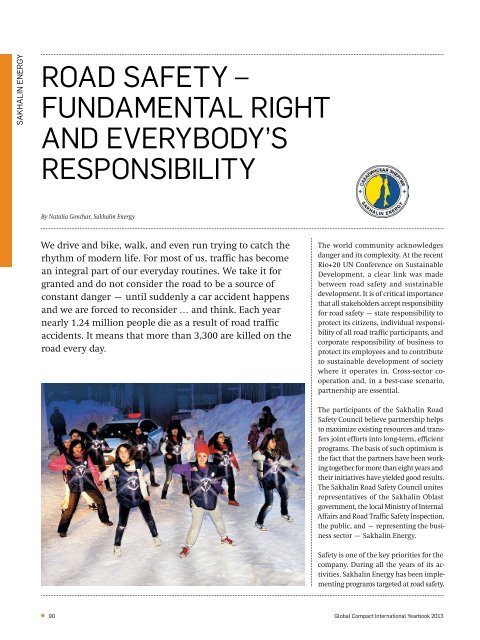Global Compact International Yearbook Ausgabe 2013
The UN Global Compact is the world’s leading platform for corporate sustainability. In describing the future aims of the Global Compact, UN Secretary-General H.E. Ban Ki-moon says: “A growing number of business in all regions recognize the importance of reflecting environmental, social, and economic considerations in their operations and strategies. Now the challenge is to move from incremental process to transformation – in society and markets alike.” The new 2013 edition of the Global Compact International Yearbook offers proactive and in-depth information on key sustainability issues and focuses on recent developments of stakeholder management such as managing corporate legitimacy, for example. Concomitant to this is the call for a more holistic reporting of companies’ financial and nonfinancial performance, which is expressed in the idea of integrated reporting. Furthermore, this edition highlights the connection between the sustainable development of African societies and the ways of managing and governing their natural wealth. The newest developments concerning the move toward a low-carbon economy are shown in the chapter on climate change, which emphasizes the importance of reducing the output of greenhouse gases. Corresponding to the idea of mutual learning, the Global Compact International Yearbook includes 43 good practices of corporate participants that showcase different approaches to the implementation of the Ten Principles of the Global Compact. The Global Compact International Yearbook is a product of the macondo media group and United Nation Publications in cooperation with the Global Compact Office in support of the UN Global Compact and the global advancement of corporate sustainability. It contains 196 pages.
The UN Global Compact is the world’s leading platform for corporate sustainability. In describing the future aims of the Global Compact, UN Secretary-General H.E. Ban Ki-moon says: “A growing number of business in all regions recognize the importance of reflecting environmental, social, and economic considerations in their operations and strategies. Now the challenge is to move from incremental process to transformation – in society and markets alike.”
The new 2013 edition of the Global Compact International Yearbook offers proactive and in-depth information on key sustainability issues and focuses on recent developments of stakeholder management such as managing corporate legitimacy, for example. Concomitant to this is the call for a more holistic reporting of companies’ financial and nonfinancial performance, which is expressed in the idea of integrated reporting. Furthermore, this edition highlights the connection between the sustainable development of African societies and the ways of managing and governing their natural wealth. The newest developments concerning the move toward a low-carbon economy are shown in the chapter on climate change, which emphasizes the importance of reducing the output of greenhouse gases.
Corresponding to the idea of mutual learning, the Global Compact International Yearbook includes 43 good practices of corporate participants that showcase different approaches to the implementation of the Ten Principles of the Global Compact. The Global Compact International Yearbook is a product of the macondo media group and United Nation Publications in cooperation with the Global Compact Office in support of the UN Global Compact and the global advancement of corporate sustainability. It contains 196 pages.
Create successful ePaper yourself
Turn your PDF publications into a flip-book with our unique Google optimized e-Paper software.
Sakhalin Energy<br />
Road Safety –<br />
Fundamental Right<br />
and Everybody’s<br />
Responsibility<br />
By Natalia Gonchar, Sakhalin Energy<br />
We drive and bike, walk, and even run trying to catch the<br />
rhythm of modern life. For most of us, traffic has become<br />
an integral part of our everyday routines. We take it for<br />
granted and do not consider the road to be a source of<br />
constant danger – until suddenly a car accident happens<br />
and we are forced to reconsider … and think. Each year<br />
nearly 1.24 million people die as a result of road traffic<br />
accidents. It means that more than 3,300 are killed on the<br />
road every day.<br />
The world community acknowledges<br />
danger and its complexity. At the recent<br />
Rio+20 UN Conference on Sustainable<br />
Development, a clear link was made<br />
between road safety and sustainable<br />
development. It is of critical importance<br />
that all stakeholders accept responsibility<br />
for road safety – state responsibility to<br />
protect its citizens, individual responsibility<br />
of all road traffic participants, and<br />
corporate responsibility of business to<br />
protect its employees and to contribute<br />
to sustainable development of society<br />
where it operates in. Cross-sector cooperation<br />
and, in a best-case scenario,<br />
partnership are essential.<br />
The participants of the Sakhalin Road<br />
Safety Council believe partnership helps<br />
to maximize existing resources and transfers<br />
joint efforts into long-term, efficient<br />
programs. The basis of such optimism is<br />
the fact that the partners have been working<br />
together for more than eight years and<br />
their initiatives have yielded good results.<br />
The Sakhalin Road Safety Council unites<br />
representatives of the Sakhalin Oblast<br />
government, the local Ministry of Internal<br />
Affairs and Road Traffic Safety Inspection,<br />
the public, and – representing the business<br />
sector – Sakhalin Energy.<br />
Safety is one of the key priorities for the<br />
company. During all the years of its activities,<br />
Sakhalin Energy has been implementing<br />
programs targeted at road safety.<br />
90 <strong>Global</strong> <strong>Compact</strong> <strong>International</strong> <strong>Yearbook</strong> <strong>2013</strong>

















